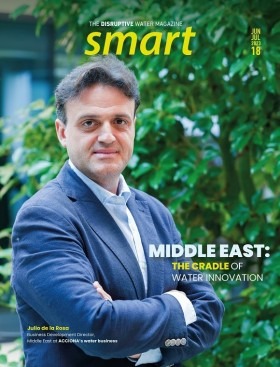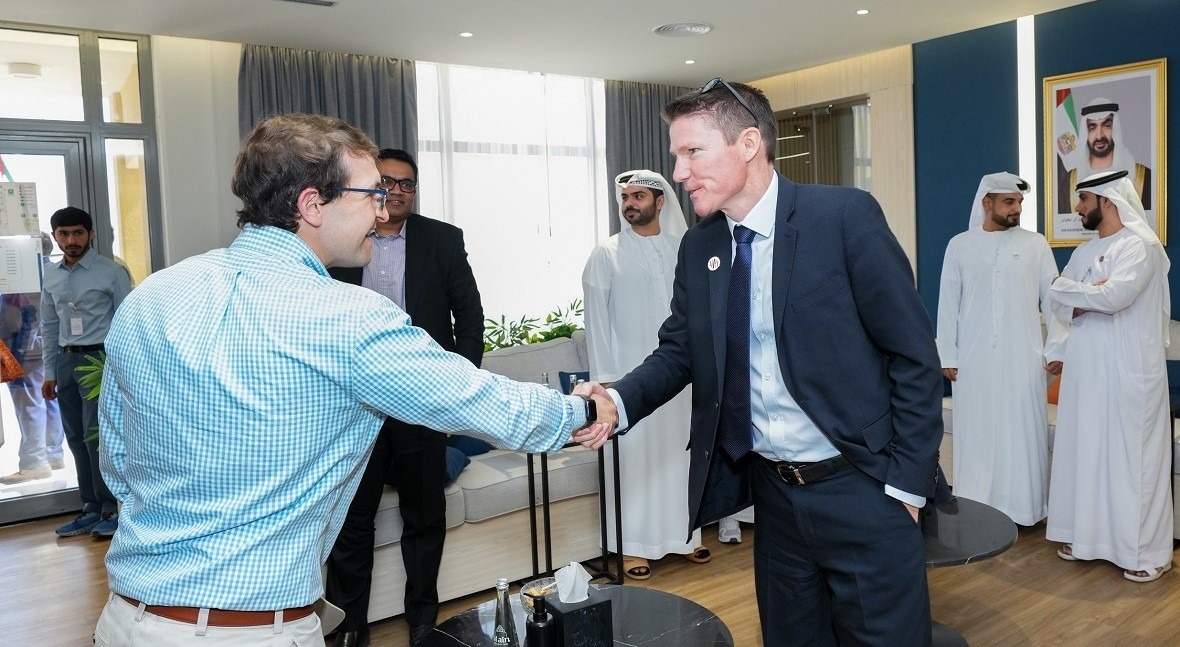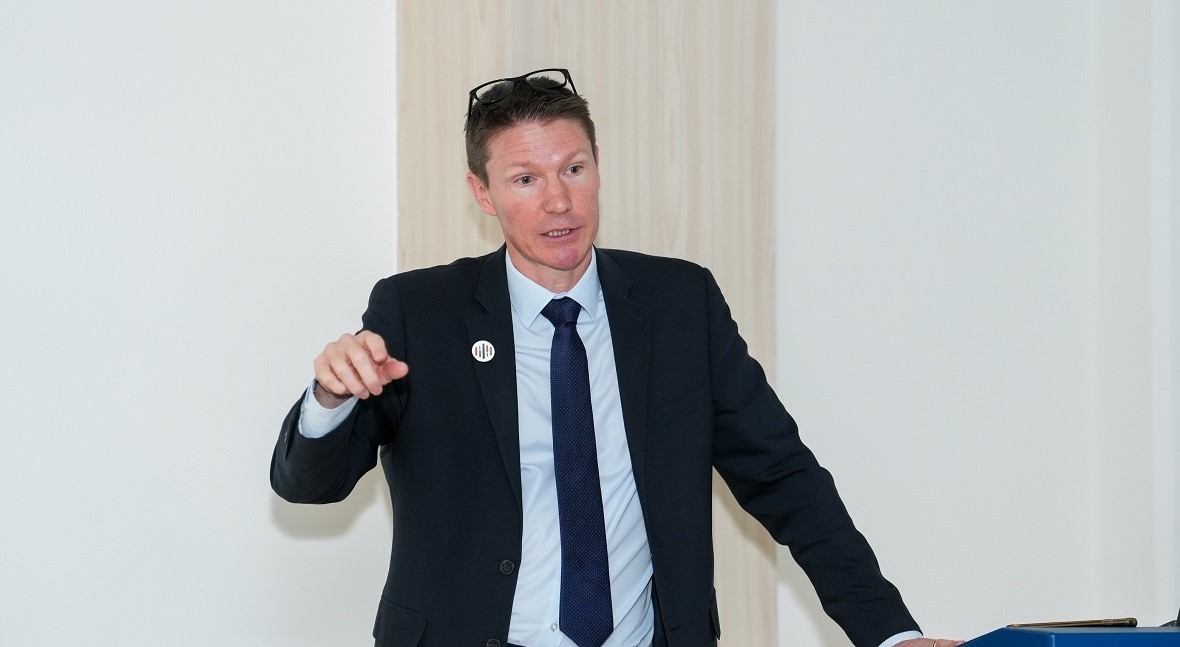“Creating a pipeline of RO projects that attract private investment drives technology innovation”

The Emirates Water and Electricity Company (EWEC) is the single buyer and seller of water and electricity in the Emirate of Abu Dhabi, ensuring there is capacity to meet demands, while translating the UAE Net Zero by 2050 initiative into a viable strategy for the power and water sector.
With no rivers or significant natural bodies of freshwater, the production of potable water in the UAE relies on desalination. As it plans for long-term demands for water and electricity, EWEC aims to increase the efficiency of its generation plants, investing in zero carbon emitting solar and nuclear power capacity to run the company’s desalination plants. We had the opportunity to interview Mark Hedges, Asset Management Executive Director at EWEC, about the company’s major water projects and their contribution to EWEC’s approach to decarbonisation.
Please tell us briefly about your career path and your current role at the Emirates Water and Electricity Company (EWEC).
With over twenty years of experience in the energy sector across various functions and international energy markets, my career has been dedicated to driving operational excellence, optimising asset performance, and contributing to the growth of the energy sector.
As the Asset Management Executive Director at EWEC, I am responsible for overseeing the efficiency of our fleet and maximising the flexibility, capacity, and production of our water and power generation plants. I manage the integration of new water and power generation into our portfolio and advance our strategic plans to decarbonise the energy sector. By leveraging my operational, commercial, and sector knowledge, I support EWEC in enhancing its power and water generation capabilities and supporting the achievement of the company’s strategic goals.
Could you provide an overview of the EWEC’s major water projects and their significance in meeting the water demands in Abu Dhabi and beyond?
EWEC is at the forefront of driving the UAE’s energy transition through commissioning and deploying renewable energy, clean energy, and low-carbon intensive reverse osmosis (RO) water desalination projects that significantly contribute to the UAE’s sustainability objectives. RO water desalination is a key strategic pillar in our plan to decouple power and water generation and decarbonise the energy sector.
We currently have four commercially operational water desalination plants using RO technology, comprising Fujairah F1, Fujairah F2, Mirfa 1, and Taweelah RO, which recently became the world’s largest RO desalination plant after surpassing 90 per cent capacity, producing 183 million imperial gallons per day (MIGD), equivalent to 831,935 cubic metres per day, of desalinated water. Once fully operational, Taweelah RO will supply 200 MIGD, equivalent to 909,200 cubic metres per day of potable water.
EWEC has also commissioned three new low-carbon intensive RO water desalination projects. Mirfa 2 Reverse Osmosis (M2 RO) Independent Water Project (IWP), reached financial close in May this year and will be the third largest RO plant in the UAE once fully operational. In addition, we have commissioned Shuweihat 4 Reverse Osmosis (S4 RO) IWP, which is currently undergoing technical and commercial evaluation of bids received for the project, and Abu Dhabi Islands RO IWP, which is going through the development process.
When fully operational, combined, these low-carbon intensive RO projects will provide an additional 290 MIGD of new reverse osmosis production capacity, enabling us to produce 618 MIGD of water from low-carbon intensive RO desalination plants by 2027.
Our latest Statement of Future Capacity Requirements 2023-2029: Summary Report for Abu Dhabi’s future water and electricity production, endorses continued investment in low-carbon intensive RO water desalination technology, which is primarily driven by RO’s efficiency advantage over existing cogeneration assets. Low-carbon-intensive RO desalination is up to 96 per cent more efficient compared to traditional thermal desalination and enables a more than 85 per cent reduction in carbon emissions.
What are the key challenges and considerations involved in ensuring a sustainable and reliable water supply in the Emirates, and how does EWEC address these challenges in its projects?
There are no rivers or significant natural bodies of fresh water in the UAE, so the sustainable production of potable water is a challenge. In addition, finding the optimal locations for developing and building new water desalination projects in close proximity to water consumers is key to ensuring we are providing consumers with a secure and reliable water supply.
The Taweelah reverse osmosis facility recently became the world’s largest RO desalination plant after surpassing 90 per cent capacity
As an example, commissioning the development of the Abu Dhabi Islands RO water desalination plants on Saadiyat Island and Hudayriat Island, enables EWEC to improve the efficiency of despatching and supplying the water produced from both plants to the residents of Abu Dhabi, while satisfying peak demand and reducing overall sector costs.
Finding the optimal locations for developing and building new water desalination projects in close proximity to water consumers is key
To enable the realisation of decoupling water and power generation, and decarbonising the energy sector, it is crucial we maintain a constant power supply from renewable and clean energy sources to operate our RO plants. Traditionally, powering water desalination during the winter period with cogeneration assets was a challenge, when power demand was at its lowest during the winter seasons. EWEC is overcoming this operability challenge by powering RO plants with nuclear energy to meet water demand.
Can you tell us about EWEC’s strategic initiative of decoupling Abu Dhabi’s power and water generation capacity?
EWEC’s strategic initiative to decouple water and power generation via developing and deploying low-carbon intensive RO technology is crucial to enable the country’s energy transition and sustainability objectives. As more RO water desalination plants are added to the system, EWEC can reduce its reliance on cogeneration assets and add further carbon-free renewable and clean energy power generation into its portfolio. Ultimately reducing the carbon emissions associated with water production.
RO technology is a key strategic pillar in our plans as it enables EWEC to substantially contribute to the UAE’s sustainability agenda. By decoupling water and power generation through adopting RO technology and expanding our deployment of solar energy, we are consuming minimal power to operate the water desalination plants, while also enabling a more than 85 per cent reduction in carbon emissions, thus effectively contributing to the achievement of the UAE Net Zero by 2050 strategic initiative.
What is the role of public-private partnerships in the company's water projects, and how do these collaborations contribute to the overall success and sustainability of the projects?
Achieving the UAE’s carbon neutrality objectives requires public and private entities and organisations to collaborate and work with each other to realise and accelerate the country’s energy transition and decarbonisation of the energy sector.
Low-carbon intensive reverse osmosis water desalination projects significantly contribute to the UAE’s sustainability objectives
Creating a pipeline of RO projects that attract private investment in the sector drives innovation in technologies that in turn EWEC and public entities can utilise to develop low-carbon water and power plants. To that end, EWEC is partnering with renowned local and international stakeholders to develop world-class utility-scale water desalination projects to provide a reliable and sustainable supply of water to achieve our goal of realising UAE Water Security Strategy 2036 and the UAE Net Zero by 2050 strategic initiative, and further strengthening the UAE’s sustainability credentials.
Looking into the future, what are EWEC’s plans and strategies to address potential water challenges, such as population growth, climate change, and increasing water scarcity, while ensuring long-term water security?
EWEC is committed to supporting the UAE to achieve its sustainability objectives by taking tangible action to diversify the nation’s energy mix. We are at the forefront of driving the country’s energy transition, and by improving the sustainability of water production in the UAE, EWEC is actively contributing to the achievement of the UAE’s socio-economic and sustainability objectives.
EWEC plans the sector’s water production demand and capacity by applying a quantitative modelling approach around power and water system supply-demand fundamentals, supported by a state-of-the-art scientific, and data-led approach to market simulation that provides unified energy modelling and forecasting water and power demand and system production cost.

Our future capacity expansion recommendations highlighted in EWEC’s Statement of Future Capacity Requirements 2023-2029: Summary Report, are primarily founded on a ‘Base Case’ scenario in which we plan to meet demand growth within the Abu Dhabi Emirate, as well as the Water Purchase Agreement contracts for water supply from our current and future fleet of water desalination plants.
These projects enable EWEC to significantly reduce the carbon emissions of water production. By 2030, we forecast over 90 per cent of our water production to be from RO desalination plants, resulting in the average carbon emissions intensity associated with water production falling from 11.5 kilograms per cubic metres (kg/m3) in 2019, to an estimated 1.4 kg/m3 by 2029.
Implementing these strategic recommendations will enable EWEC to ensure a reliable and sustainable water supply across the UAE in line with the UAE Water Security Strategy 2036, and to reduce the average carbon emissions intensity associated with water production by 88 per cent by 2023, supporting the achievement of the UAE Net Zero by 2050 strategic initiative.





